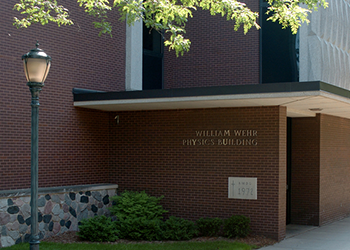Department Chair and Associate Professor
Political Science
Lowell Barrington is Associate Professor in the Department of Political Science. His teaching and research specializations include post-Communist politics, ethnicity and nationalism, democratization, and political science research methods. Prof. Barrington has received research grants from the National Science Foundation (NSF) and the National Council for Eurasian and East European Research (NCEEER). He is a Research Affiliate with UW-Madison's Center for Russia, East Europe, and Central Asia (CREECA). He has also served as Editor-in-Chief of Analysis of Current Events, as a Social Science Proposal Reviewer for the National Research Council, and was Vice President of the Association for the Study of Nationalities (ASN).
Prof. Barrington's publications include Comparative Politics: Structures and Choices, currently in its second edition (Cengage, 2013) and under contract for a third edition with Cambridge University Press. He also has an edited book (University of Michigan Press, 2006) titled After Independence: Making and Protecting the Nation in Postcolonial and Postcommunist States. His research articles have appeared in Comparative Political Studies, Europe-Asia Studies, European Journal of Political Research, Georgetown Immigration Law Journal, Harvard International Journal of Press/Politics, Journal of Central Asian Studies, Nationalism and Ethnic Politics, Nationalities Papers, Political Research Quarterly, Post-Soviet Affairs, Post-Soviet Geography and Economics, PS: Political Science and Politics, Review of Central and East European Law, and World Politics. He is also the author of book chapters on Baltic citizenship and nationalism and regional divisions in Ukraine.
In the classroom, Prof. Barrington strives to help his students develop the ability to understand and explain major political outcomes. Similar to the central theme of his textbook, he encourages students to make sense of the many possible causal factors affecting politics by thinking about them as types of structures (political, cultural, identity-related, and economic) or choices (individuals and decision making). Like others in the Department of Political Science, he seeks to develop his students' ability to critically assess problems presented to them. His central concern in the classroom is how his students develop and support their arguments about politics rather than the positions they ultimately take.
An avid tennis player, Prof. Barrington has worked as a professional tennis instructor at two different tennis clubs (in Madison, WI and Jackson, WI).
Education
Ph.D., University of Michigan, 1995
Courses Taught
- POSC 2401 Comparative Politics | Syllabus
- POSC 2601 International Politics | Syllabus
- POSC 4421 Democracy, Authoritarianism and Totalitarianism | Syllabus
- POSC 4511 Russian and Post-Soviet Politics | Syllabus
- POSC 4711 International Politics of Europe | Syllabus
- POSC 6101 Contemporary Political Research | Syllabus
- POSC 6446 Comparative Democratization | Syllabus
- POSC 6441 Comparative Nationalism | Syllabus
- POSC 6956 Research Seminar in Comparative Politics: OLS Regression Analysis in Comparative Politics | Syllabus
- HOPR 1953 National Identity and Multiculturalism | Syllabus
Publications
Books:
- Comparative Politics: Structures and Choices, 2nd edition (Wadsworth/Cengage, 2013)
- Comparative Politics: Structures and Choices (with contributions by Michael Bosia, Kathleen Bruhn, Susan Giaimo, and Dean McHenry) (Wadsworth/Cengage, 2010)
- After Independence: Making and Protecting the Nation in Postcolonial & Postcommunist States, Ann Arbor: University of Michigan Press, 2006
Selected Articles:
- “A New Look at Region, Language, Ethnicity, and Civic National Identity in Ukraine,” Europe-Asia Studies 74, no. 3: 360-381, DOI: 10.1080/09668136.2022.2032606.
- “Is the Regional Divide in Ukraine an Identity Divide?,” Eurasian Geography and Economics. Published online: Mar 15, 2021: DOI: 10.1080/15387216.2021.1899835.
- “Citizenship as a Cornerstone of Civic National Identity in Ukraine,” Post-Soviet Affairs 37, no. 2 (2021): 155-173; DOI: 10.1080/1060586X.2020.1851541.
- "Fragile Snapshot or Stable Relationships? What the Orange and Rose Revolutions Reveal About the Stability of Cross- Sectional Survey Data," Comparative Political Studies 45, no. 3 (2012): 312-340.
- "Reexamining Region, Ethnicity, and Language in Ukraine" (with Regina Faranda), Post-Soviet Affairs 25, no. 3 (July-September 2009): 232-256.
- "Bias in Newspaper Photograph Selection" (with Andrew Barrett), Political Research Quarterly 58, no. 4 (December 2005): 609–618. Reprinted as the majority of chapter 14 of Janet Buttolph Johnson, H. T. Reynolds, and Jason D. Mycoff, Political Science Research Methods, 6th ed., Washington, D.C.: CQ Press, 2008.
- "Is a Picture Worth a Thousand Words?: Newspaper Photographs and Voter Evaluations of Political Candidates" (with Andrew Barrett), Harvard International Journal of Press/Politics 10, no. 4 (Fall 2005): 98–113.
- "One Ukraine or Many?: Regionalism in Ukraine and Its Political Consequences," (with Erik S. Herron), Nationalities Papers 32, no. 1 (March 2004): 53-86.
- "The Motherland is Calling: Views of Homeland among Russians in the Near Abroad," (with Erik S. Herron, and Brian D. Silver), World Politics 55, no. 2 (January 2003): 290-313.
- “Economic Calculations, Cultural Perceptions, or General Outlooks on Life?: What Shapes Views of the ‘Ethnic Other’ in Kazakhstan,” Journal of Central Asian Studies 7, no. 1 (Fall/Winter 2002): 2–30.
- "Views of the Ethnic 'Other' in Ukraine," Nationalism and Ethnic Politics 8, no. 2 (Summer 2002): 83–96.
-
"Examining Rival Theories of Demographic Influences on Political Support: The Power of Ethnic, Linguistic, and Regional Divisions in Ukraine," 41, no. 4 European Journal of Political Research(June 2002): 455–491.
-
"Understanding Public Opinion in Post‐Communist States: The Effects of Statistical
Assumptions on Substantive Results" (with Erik S. Herron), Europe-Asia Studies 53, no. 4 (June 2001): 573–594.
-
"Russian-speakers in Ukraine and Kazakhstan: 'Nationality,' 'Population,' or Neither?" Post-Soviet Affairs 17, no. 2 (April–June 2001): 129–158.
-
"A Reply to David Laitin," Post-Soviet Affairs 17, no. 2 (April–June 2001): 164–66.
- "Less Assessment, More Learning," Academe Nov-Dec. 2003
Additional Information
Recommended Links:

